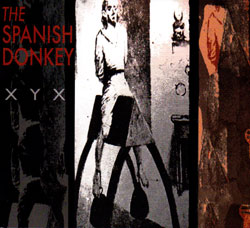
Spanish Donkey is something of a super-group of eclectic, seriously hirsute, mostly underground musicians. Guitarist Joe Morris is perhaps the most well known. He has spent decades refining his singular contributions to those six familiar strings. Along the way he has migrated this vision to several other species of twanging, buzzing instruments, including banjo and acoustic bass. Jamie Saft, mainly audible here on Mini-Moog and Juno synths, is a New York multi-instrumentalist who has worked with Bobby Previte and John Zorn. On drums is a name seen on many band rosters and liner notes: Mike Pride. His resume reads like a who's who of outside music, from Braxton to Millions of Dead Cops.
It is tempting to riff on the group's moniker in gaining verbal handle on its sound — as the CD cover illustrates, the spanish donkey is a torture device of the sort that Inquisition-period "spirituality" was inclined to invent. But even such a mechanism seems to underserve the bombast this band serves up. Galactus or Godzilla seem more appropriately scaled.
This is, after all, something of a power trio. They continually forge a big wall of sound. And it is also an overall ominous sound — nothing here ever seems calm, meditative. It seems draining for the players, and can be so for the listener at times. This is heavy, heavy music. It is somewhat reminiscent of the less-frenetic tracks on the CD "Saisaro," which matched Derek Bailey with Japan's Ruins. Metallic hardcore meets the avant garde, if you will (and this description seems especially apt in the mid-teens of the long first track "Mid-evil").
If the first track is "Mid-evil," the title track seems to be full-on evil. Saft's stays in the low, horror show registers for several minutes. This keeps Morris, uncharacteristically, in a slower mode than his often quicksilver lines. Instead, he lops off chunky intervals from his strings, letting the tension continue to build. Several minutes in, Pride coaxes the band into a slow lope, drumming with an appropriately heavy, Bonham-like hand. The clashes of sound are thicker on this track, several times coagulating into dense, throbbing tangles of sound. The result is sullen, apocalyptic.
A notable tip for listening: Don't try this on ear buds. It is absolutely crucial to listen to this on a stereo that is closer to the full dynamics of the origin. On systems that compress sounds and reduce their complexity, this record can sound like garbage. The details here are essential. If you miss them, you have not actually heard Spanish Donkey.
Comments and Feedback:



More Recent Reviews, Articles, and Interviews @ The Squid's Ear...


|

